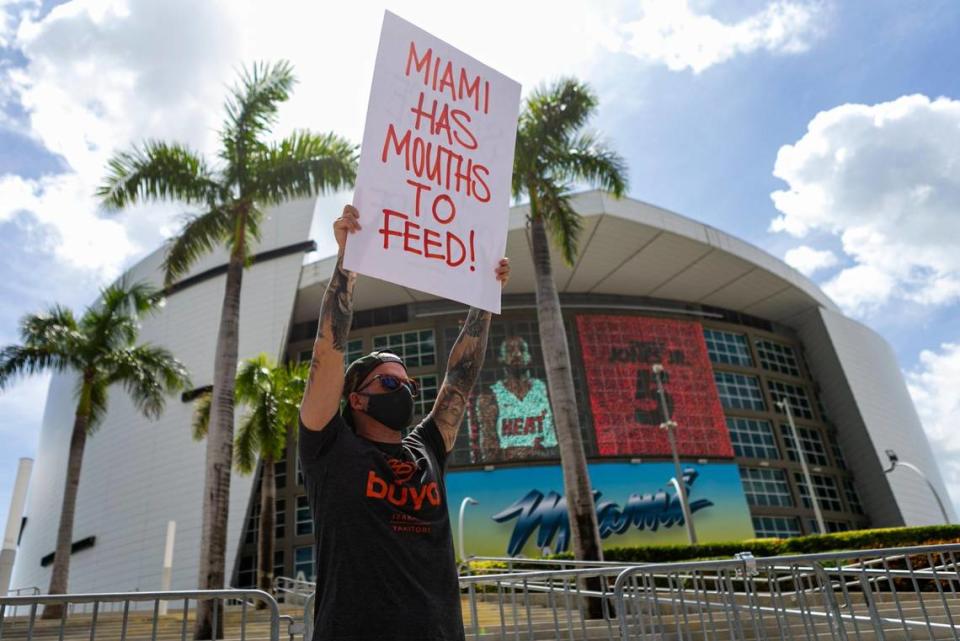‘Tell us why.’ Restaurants protest Miami-Dade mayor’s latest dining room shutdown
Dozens of independent Miami restaurant owners closed their shops and showed up downtown Friday to protest the recent Miami-Dade County order that shut their restaurant dining rooms.
Carrying signs with slogans like, “no science, no closures,” the hastily unified group of small business owners demanded that County Mayor Carlos Gimenez produce data — from contact tracers or otherwise — that showed a recent spike in Miami-Dade COVID-19 infections could be tracked to restaurants. Restaurant owners say they have been singled out, while the mayor’s order, which went into effect July 9, allows gyms, construction sites and office spaces to stay open.
“We’re not protesting the closure. We’re protesting getting singled out,” said Ani Meinhold, owner of the MiMo District Vietnamese restaurant Phuc Yea. “No one is saying don’t close us. We are saying, ‘Tell us why.’ ”
On Monday, Gimenez stated his intent to roll back his New Normal plan by closing gyms and restaurants, except for takeout and delivery. He changed his mind before the day was out, allowing outside seating at restaurants, and, the next day, allowing gyms to stay open if people wore masks inside.
At his press conference, alongside Florida Gov. Ron DeSantis, Gimenez cited guidelines from the World Health Organization that said “taking off your mask in an interior space, according to our experts, is dangerous because the virus spreads as people talk.”
But the mayor’s order was quickly met with resistance.
The 25 city mayors in the Miami-Dade County League of Cities signed a letter expressing their opposition over Gimenez swiftly closing dining rooms without consulting other city leaders.
Miami-Dade has not released contact-tracing data to show the source of the county’s COVID cases, despite repeated requests over the last four months. The county announced it would add 250 more contact tracers Thursday, after two months of negotiations with the state health department over who would pay for it.
Restaurant owners demanded to see the statistics the mayor was using to point to restaurants in particular as the reason for the outbreak in Miami-Dade County.
“We understand it’s a difficult position the mayor is in. I hope it doesn’t stop him from doing the right thing,” said Nick Sharp, owner of Threefold Café, with locations in Brickell and Coral Gables, who helped organize the rally this week.

Gimenez released a new statement late Friday, reiterating that restaurants are the only indoor business where people can’t keep masks on the whole time.
“It’s clear from the science — both the CDC and the WHO — that social gatherings, especially indoors, without masks is a recipe for a public health disaster,” his statement read in part. “With our current positivity rate throughout the county, it would be irresponsible and outright derelict for me to allow indoor dining at this time.
“As it is, the positivity rate means that one of every four or even one of every three diners are carrying the virus, whether they know it or not, and the spread is airborne with studies showing longer periods of time where the contagion remains suspended. That is the science.”
Gimenez said restaurant dining rooms will remain closed until no more than 5 percent of all people tested for coronavirus show a positive result. This week alone there have been more than 11,000 new cases, with more than 20 percent of all people tested proving to have the virus, according to the county’s statistics.
Many of Friday’s demonstrators, amounting to about 30, closed their restaurants for the day to show support. Some have decided to temporarily close their restaurants altogether, because they cannot survive on takeout and delivery.
Harry and Michelle Coleman, owners of west Kendall’s Empanada Harry’s, drove across the county to add their voices to a protest asking the mayor to show the county’s research. They said their restaurant has been staying afloat with takeout but they wanted to show support to others.
“You can’t just single out one industry and say we’re the problem,” Harry Coleman said. “By just closing restaurants, you’re never going to get to five percent.”
No takeout, no delivery: These Miami restaurants are closing until COVID-19 passes

